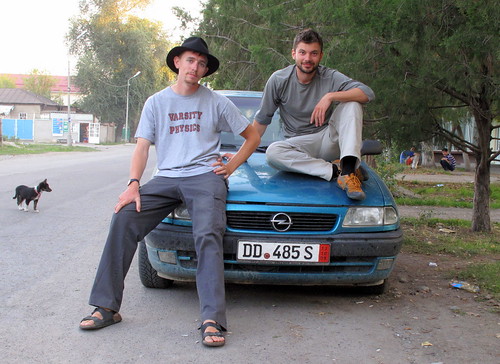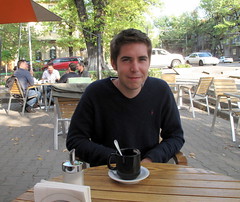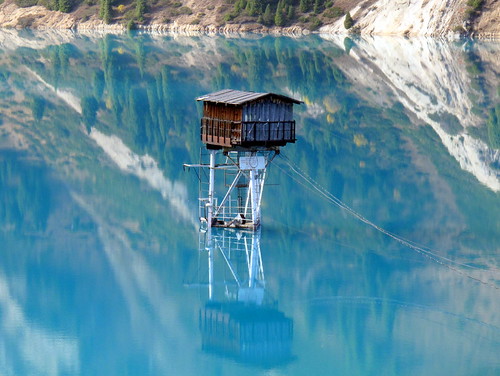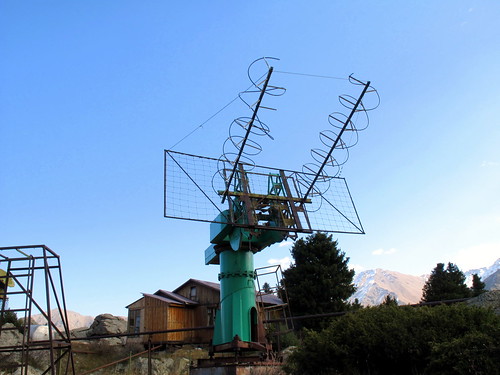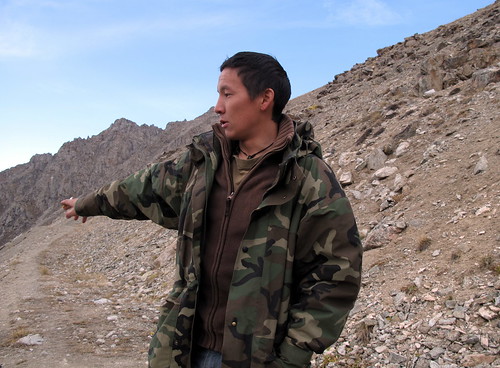The last hurdle…
It was going to be my last day in Kazakhstan. I got into Astana by train in the morning, successfully picked up my passport from the office of the yogurt company DANONE (arranged through a new Kazakh friend!), visited the president’s mansion museum (where I particularly liked the Saudi’s gift of a 24k gold machine gun on display), met some locals through CouchSurfing, and went on a tour of Astana’s new capitol promenade (which is still under construction but aims to match the Washington Mall).
What I didn’t realize when I confirmed all of the details over the phone with my aunt and got into the train bound for Ekaterinburg was that my Kazakhstan visa was going to expire at midnight, and the train was not going to reach the Russian border until another 11 hours later.
This is the story of how I was removed from the train at the border checkpoint of Kairak by Kazakh border guards, arrested and charged with illegal trespass, handed over to the custody of immigration police, and the court case that followed…
Platzkart (Sardine Class)
For no particular reason, I got tickets in Platzkart (sardine class). This train runs a many day Almaty to Saint-Petersburg route so there aren’t any seating only tickets, but there does exists a class of train car where 6 people sleep in the space where 4 would fit were it a cabin. There are no doors or privacy, and this is a perfect time to learn the intimate details of your fellow travelers’ lives, which is what everyone naturally does.
First discovery of expiring visa, and How I met Irlan.
On a dark service platform, several hours after we chugged out of Astana, the immigration police hopped aboard. They worked through the train. “Documents please!”
“Do you know your visa is about to expire?” This guy was so proud of himself and didn’t bother containing his glee. This was the first time I got a good look at Irlan. Tall, oafy, big flat round face, red in the cheeks from years of boozing, dark straight Asian hair, good natured yet tricky.
It was true, though I didn’t know it, my visa was about to expire. In another hour, I would be trespassing on Kazakhstan soil. I tried different responses: Is this a big deal? What time will we cross the border? Can you help me fudge the 15 into a 16 with a pencil perhaps? How may we resolve this?
He said, he’ll think about what to do with me the following morning, and so with a faint hope I climbed onto the rickety shelf which I outfitted into a bed, and went to sleep wondering what was going to be his next move.
Morning in “on a big map you will find here.”
The ear plugs, eye shields and the vibration of the train combined for an unexpectedly good night of sleep. Because it was closest to the passageway, Irlan decided to tug my toe to wake me. By morning, I was officially in violation of the visa. “Come, we need to copy documents.”
I already had copies of my visa and passport, so I brought them along trying to avoid getting off the train. He said, “No, we have to go copy them at the station. I have to turn you in. I caught you.”
“Where are we?”
“On a big map, you will find here,” he replied, then mentioned something about arrest, court, consulate, visa renewal, fines, jail time in a cell that’s worse than platzcart…
I’ve been in this situation with officials before. It’s as if he wanted the worst case scenario to settle in, to seem so palpably near, before finally… after a long pause… finally,
“Or …” he said and smiled. He looked around, closed the door, sat down, and crossed his hands.
“Let’s talk frankly.”
Oh, how choreographed and expected this all was! I was selectively ignoring all of those unnecessary complications such as arrest and reviewed my deck of cards. I had 140$ (a 100 and two 20s) in US cash. I had 3000 tenge (~20$). How much was I willing to spend and what was I intending to buy? That was the question.
“Let’s.”
“For 3,000 rubles (~100$) I will pretend that I did not see you on the train. When you get to the border, you will fend for yourself. I am not a border guard. My job is to catch you and turn you in here. That is what you are buying. For 6,000 rubles, we might be able to arrange something at the border.” He gave me a long hard look. “So what are we going to do? Think fast. Or should I turn you in?”
“Let’s keep going to the border.” I just needed to stay on the train, but I didn’t want to commit to anything yet.
“Ok, brother. Go back to your place. I will find you in a bit.”
This conversation left me on alert, but I tried not to show it as I lost myself in hobnobbing with the train passengers, most of whom were Russians. Most of the Kazakhs got off at this train station. Next stop was the border. The conversation focused on comparison of which nation drank more, which did more heroin, and who had more delinquents.
“Most of the children now days are imbeciles,” said Anya, a doctor born in Kazakhstan but educated in Saint Petersburg. “Religion used to keep the Kazakhs more conservative, but in the new economy they are catching up in all manner of depravity.” Galina, Anya’s 67 year old grandmother lamented about the absurdity of the border where none had been before, and the customs laws had appeared dictating which sausage she can or can’t carry between her and her daughter’s home.
When I went to the bathroom, I spotted how one of the train conductors removed a bolted metal panel bolted between the train cars and stuffed a whole sack of sausages in there. He looked at me looking at him but said nothing.
The Conditional Bribe of the real Kazakh-man handshake.
It was time. Irlan was ready for me. I walked into the small compartment at the end of the car which he commandeered into his office and locked the door. It came time to actually perform the bribe–to grease the proverbial palm. I had the bills distributed in my pockets so I’d know where to reach without giving away too much information. Irlan suggested thinking of the deal as two transactions, one to appease him, and another for the guards. My goal was singular, to get on the other side of the border without incident. For Russia, I had a completely valid visa.
We talked at length, which is how I got him to sympathize with me. You see, bribes are something you can bargain down, depending on your condition. “I’m a student. I’m traveling the world on my student stipend which I saved up for many years. I am a guest in your country. I’m trying to get home to my historic homeland, my hometown, where my aunt is waiting for me. I don’t have any money.” And so the price came down from $500, 400, 300 and at last we settled on something I actually had… one hundred dollars.
And this is when I said, “Irlan, I’m giving you this so I will not see you again. If I do not cross the border, it does not matter why, but I cannot say in such a case that you have deserved this bribe. This is what I am buying with this bill.” I reached out my hand and said, “This is a real Kazakh-man handshake.”
Irlan declared quizzically, “there are no women around here!” and shook my hand. “I will do my best.” He took my passport, instructed me to relax back at my seat and when the border guards get on the train, say “the immigration police have my passport.”
“Grab your things and get off the train.”
The customs officials got on and predictably took away Galina’s sausage. “You do this every time!” I told them about my passport and waited, and waited. When the border guards returned as a team, they didn’t tell me what I wanted to hear. I was to pack my things and get off the train. I never stopped trying, but then I came to accept the fact that no amount of talking, pleading, conniving, was going to keep me on board this time.
When I was standing with my stuff on the train station, looking around for some understanding, Irlan appeared with a solemn face. You could see he wasn’t happy. He handed me back the passport with the hundred dollar bill folded inside. “I’m sorry. The problem is the computer! The computer knows your visa has expired. They cannot let you go because the computer will know they let you go. Unfortunately, we have to follow protocol and place you under arrest.”
Two important lessons came out of this interaction. (1) Electronic records actually reduce corruption. (2) A real Kazakh-man handshake is as good as a contract. With regards to the latter, it may now seem like I knew what I was doing back in the train compartment with the “Kazakh-man handshake” business, but the fact is I was just winging it.
Kairak, the Matryoshka Guard Post.
I was instructed to carry my things to the back room of the border guards’ quarters, and asked to write a confession. I treated it as an exercise in written Russian, and tried to write vaguely as to leave all of my options open. Within this small old wooden station, I observed a peculiar pattern in the hierarchy. There was one of each kind of guard based on their shoulder patches. One puny guy had a blank patch and a guard each sporting a patch with one arrow, two arrows, one star, two stars, and so on up to up to the big boss with four stars. That was Ermek.
What was most peculiar was that each superseding guard was larger than his/her subordinates. As a rule, the subordinate could completely fit inside the ranking officer, as if they were matryoshka (Russian nesting) dolls. And if there did exist anyone superior to Ermek that would be a logistical problem, because they would have to reframe all of the door posts. For such was Ermek, round faced, red nosed, pimply, broad shouldered and good humored.
When I walked into his office with the confession, he immediately liked my Lamy fountain pen and offered to trade it for a pencil. “I joke.”
How the border officials treated me.
Rinat, of three stars, a slightly smaller table and slightly less ostentatious demeanor reviewed my statement. He didn’t seem to care what was actually written. He only insisted, comically, that I add one more sentence at the bottom.
“I have no problems or objections to the way the officials at Kairak border station treated me.”
I asked why? He said it was important. We played like this for a bit and I realized I had some kind of weird power that I wasn’t sure how to use in this case. He wasn’t willing to trade that statement for my freedom, so eventually in exchange for lunch, I wrote what he wanted.
He told me the charge, showed me the statute in the legal code that specified a punishment of imprisonment of up to 15 days and fine up to $500. I played legal scholar and looked for other, applicable but more lenient statutes, but at this point it was all in the cards, whatever may be… I had a few hours while waiting for transport back to Kastanay, the regional immigration police center, and they were going to take over the case.
Madina, the runaway.
I sat across from Madina while writing my “confession” but during lunch we no longer had an enforced silence, and her tears dried up a little, and she seemed ready for some small talk. She looked frail. Her bitten nails were covered with black nail polish. Later when we rode in back of the same car, she spoke to me more frankly. I’m just going to tell it how it is, as I have to practice writing about the darker side of things I saw for future posts.
Madina, 18, ran away from her lycee in Fedorovka where she was in her first year studying to be a chef. She bought a ticket to the border, got off the train and started walking along the tracks towards Russia when the guards caught up with her. She was raped the night before by her ex-boyfriend. She broke up with him before after having an abortion. Seeing as she was bruised, covered in hickies, and without a good explanation of what she had been doing the night before, she couldn’t face heading back to the dorms where they keep tight control over student’s comings and goings. She also didn’t want to tell anyone about her ex-boyfriend as she deemed it was going to lead to even more problems. So as unprepared as she was to run away — no money, no documents, cell phone but no cell phone charger, no change of clothes, just a bag full of makeup — she decided that morning that it was a better option than facing the school director.
Now that she had time to think about it, she was relieved that she was caught and spending time in the company of someone actually willing to listen to her. She wanted me to listen to her sing, and asked me to take lots of pictures of her for my memory. She told me it was going to be boring without me. We went out in the yard and exercised using the border guards’ equipment.
Drama and dysfunction of the guard station.
When I asked for permission to tour the town, the guards laughed and said “just don’t go too far.” The joke was there wasn’t much to tour as surrounding the 5 shacks, the free roaming chickens pecking a piles of trash, an angry suicidal dog on a metal leash, and a puzzling park bench with a mushroom styled umbrella colored like amanita muscaria, there was just flat flat steppe in every direction, and the largest geographical features were the occasional slightly taller tufts of discolored straw.
When I came back, Madina told me that one of the guards (one star) gave her a piece of chocolate and asked for her phone number. Said he seemed pretty nice, but then she accidentally walked in on him kissing with one of the female guards (one arrow). I write this just to underline the drama and dysfunction of the guard station.
“It’s statistics brother.”
Another guard (two arrows) called me over and we talked about his wife. He told me that the best way to keep a woman honest is to get her pregnant. “I was watching this Russian TV show about adultery and I noticed how most of the women who were cheating didn’t have children.” He also said that having a child helped calm him down. “You know how you come home, angry from a day of work and you want to take it out on your wife.” He made a gesture as if grabbing someone and bending them over to beat them. He got into the act, yelling at his virtual wife, “Where have you been? What have you been doing?” Now he says, when he sees the baby, it helps to suppress that urge, since he knows his wife has been busy tending to the baby, as there is no other choice — it’s just that much of a time drain. I nodded and told him that I understood his advice. “It’s not me, it’s statistics brother,” he said, referring back to his observations on the television show.
Collective Booking
Madina was delivered to her lycee, and I was taken to the city of Kastanay. I was handed over into the custody of none other than Irlan, and the first thing he asked me was whether I told anyone about our financial interaction. When I convinced him I didn’t, he became my best friend. From then on, I was his and the whole of immigration police departments pet project.
They booked me collectively. Initially, I was behind bars, but there were three people tending to me. One was now writing a new confession from my perspective. They strategized amongst themselves about the best way to phrase it as to make me seem most innocent. The last line was “I do not have any problems or objections to the way the Karabalyk Immigration Police employees treated me.”
Another was writing up the official charge against me from the police perspective and he too was asking for everyone’s input of how exactly to phrase it. The argument and crosstalk was rolling. At the same time I requested one of their cell phones to SMS my aunt in Ekaterinburg who was getting ready for my imminent arrival, and when she called back, I was trying to outshout the noise they were making so she would hear me.
It was an ant farm, and I felt like the queen. One of the guards took my train ticket and passport to photocopy them and run to the train station to get me a refund on the unused fare. Irlan stressed that he make sure they give me as much as possible. He was now my advocate and financial advisor. “He is a student and traveling on his saved up student stipend.” And to me, “you have to conserve your money.” It was touching but I wasn’t sure where this was leading.
The Lenient Judge
I was amused to a point, but I really wanted to know what was going to happen to me next. I read yet again from the Kazakhstan legal code what the maximal punishment for my transgression was, but what was the minimal one and who decided? Where was this court they were talking about? What was the plan for tomorrow (Saturday)? Where was I going to sleep? When was I going to get to Russia?
They merely told me to relax. Things were going to work themselves out. I knew I had the option of calling the US embassy for help, but from experience I knew that this help is occasionally useless. So I kept that card in my hand for the now.
When the police chief left, Irlan and his buddy at the station motioned to me to come out of the cell. They said something to the others, took me down the hall and we walked out of the station. “How about some beer,” said Iryukhan, and in the same breath he asked Irlan whether he could spot him 1000 tenge (6.5$) until his next paycheck.
By then, they were changed into their civilian clothes. We got into Iryukhan’s car and took a short ride around the small town. They pointed out monuments to me which I could care less about, as I was set on only one thing, “Is court open on Saturday?”
“We’ll try to wake up the judge and the prosecutor”
“How do the judge and prosecutor feel about being woken up? Does that make them angry?”
“We’ll try to wake up the lenient judge.”
“The lenient judge?”
Iryukhan told me there were three judges. The two male judges were not preferable. One doesn’t like foreign transgressors of Kazakh law and the other really doesn’t like foreigners at all. The woman was preferable. She was the lenient judge. He told me not to worry too much as we had little control, and for now, we were just going to have some beers and concentrate on getting to know each other.
“Never forget that you have friends here in Kazakhstan.”
Irlan still seemed concerned about my finances as he bought us several liter bottles of beer filled from the tap and some smoked fish to snack on. We went to the juvenile detention quarters in the back of the train station, put our feet up on the table and had a good chat over beer and fish.
Irlan made me promise I wasn’t going to tell their police chief tomorrow anything about this, and when he was happy with my assurances he told me, “never forget that you have friends here in Kazakhstan.” It turned out that we are the same age and were born in the same Soviet Union and this touched him so sincerely that he almost shed a tear with the final toast. But he restrained himself and said they had to go, that I was going to get a shower and a bed at the train station hotel, but they were going to hold on to my passport, and that I would be seeing him tomorrow at 7AM, when he was going to come to wake me so that I’d have enough time to wash up before we started our long drive at 7:30AM to court.
“Soon, we’ll be living like Arabs!”
Irlan was prompt. He waited for me to wash up, then took me out for breakfast of coffee, yogurt and some crackers (which he paid for). Iryukhan and the police chief pulled up promptly at 7:30AM and motioned us in. They briefly joked about the gas savings of leaving Irlan behind, and seeing as he really wanted to go, they said he has to pitch in for gas.
We drove about a 100 miles to court in Karabalyk. We left that early as we needed to make it before 10AM. We drove through empty fields and desolation. They told me about a recent accident where a drunk truck driver with load of fuel forgot he had two segments when he tried to race across the train tracks. We drove by Fedorovka where Madina was probably still asleep. Her lycee looked like a cinderblock, but so did much of the rest.
They asked me what I think of Kazakhstan, and before I really got a chance to answer, the police chief said, “Well, take a good look at it now. It looks nothing like it did 10 years ago. If you come back in another 10, you will see, we’ll be living like Arabs.”
Court
We waited for a while for the judge to show up. The prosecutor arrived first. He was 21 but looked like a teenager. It was his first case he said, and then we found out he was the equivalent of an intern at the prosecutor’s office.
Then the judge walked in. Her name was, Honorable SS Usenko. To me she was just, “the lenient judge”.
I waved my right to a translator and to an attorney and represented myself in court. I spoke as eloquently and as obsequiously as I could, taking responsibility for the trespass, while underlining my efforts to actually make it out of the country, and only failing by 11 hours. I told her of my recent PhD defense, of my long journey through Central Asia where I have loved the land and enjoyed the hospitality of the people, of my current pilgrimage to my “historic homeland” where my aunt is madly worried about me, about how I always, always obey the law, and how I very sincerely, on behalf of my country and Obama, my state and Arnold Schwarzenegger, myself and my family beseech her to be lenient in her judgment.
I don’t know what got into me. It even sounded good to me. I spoke calmly, with a measured voice, a clearer Russian than I have heard myself speak since ever. I don’t know if my speech needed to be as elaborate as it was, but such it was, and the chief of police patted me on the back afterwards.
The judge thanked me and turned to the prosecutor for his remarks. “I seek a guilty verdict and a punishment of one day in jail and a fine of $500.” Honorable SS Usenko then turned to me and asked me to leave the courtroom.
My Boys
The three cops and me collapsed into the couches outside. They all took out their cell phones to text or talk. We refocused when the prosecutor came out. They called him over. “So what did the judge say?”
Pause. Consider the scene. I am the defendant, sitting with three police officers. The chief of police is pulling over the 21 year old prosecutor and asking him on my behalf…
“It seems like she might actually let him off,” the boy said without emotion. My boys, for so I started to think of the cops by this point were of mixed feelings. They were happy for me that I was getting out of this, but they were also kind of sad that we didn’t get to drive around to more monuments, drink more beer, maybe go fishing on Sunday.
The Verdict, A Verbal Warning.
The judge delivered her written verdict. She cited a statute (68) that allows the judge to let the defendant off with a verbal warning in the case where the magnitude of the transgression is not in correspondence to the severity of the punishment suggested in the legal code. And so, upon the wisdom of the Kazakh legal code, I was free to continue my travels.
Irlan invited me out for a coffee and éclairs while we waited for the judges declaration to be copied and stamped with the official seal. They also called ahead to the auto border post and warned the chief of patrol that I was to be let through on account of this declaration.
Goodbye
My boys drove me to the station in Karabalyk where a bus was just about to leave. Irlan ran in and bought me a ticket to Chelyabinsk, Russia as I boarded the bus. All three of them stood besides the window and waved until the bus pulled away. “It’s going to be boring without you,” was the last thing that Irlan told me.
On the bus, I sat next to a border guard who was getting a ride to the post. His name was Vas’ja, and unlike the others, he let me take a picture of him. He told me the story of a schoolmate of his that moved to San Francisco ten years ago and married an American. “She did the absolute right thing for herself and I don’t blame her, but the guy she was engaged to Kazakhstan, completely lost his mind after that.”
He told me her name, and though he didn’t want me to try too hard. “If you meet her in San Francisco, say hello from Vas’ja.”
Russia
And so I cleared the last hurdle before entering my historic homeland. Â And so, to my mind, ended OffSilkRoadin’.









